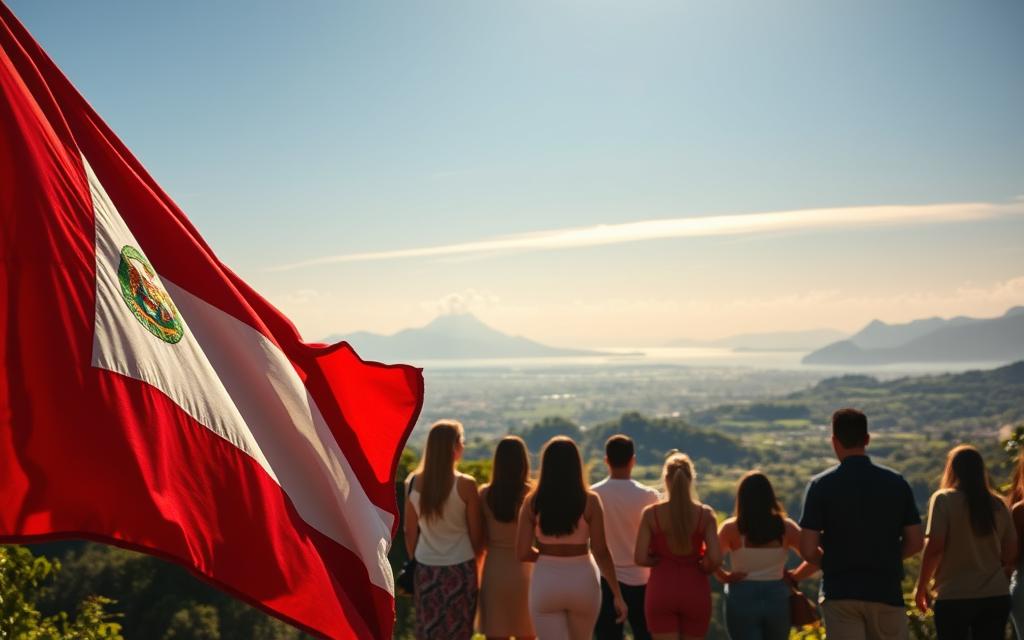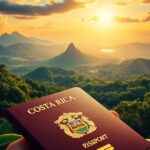Can I Keep My Original Citizenship in Costa Rica?

Costa Rica is known for its stunning natural beauty, mild climate, and welcoming culture. Over the years, it has become a top destination for individuals and families seeking a better quality of life. The country offers a variety of residency options, including Rentista, investment, and permanent residency, each designed to cater to different needs.
One of the most appealing aspects of Costa Rican immigration law is the allowance for dual citizenship. This means applicants can retain their home country’s nationality while enjoying the benefits of being a Costa Rican citizen. From access to quality healthcare to visa-free travel to over 140 countries, the advantages are significant.
In this article, we’ll explore the pathways to obtaining Costa Rican citizenship, the requirements, and the benefits it offers. Whether you’re drawn to the country’s rich culture or its stable government, understanding the process is the first step toward making Costa Rica your new home.
Residency options include Rentista, investment, and permanent residency. Each pathway caters to specific requirements, making it easier for applicants to find the right fit. For instance, Rentista residency is ideal for those with a steady income, while investment residency appeals to entrepreneurs looking to contribute to the local economy.
One of the most attractive aspects of Costa Rican immigration law is its support for dual citizenship. This allows individuals to retain their home country’s nationality while enjoying the benefits of being a Costa Rican citizen. From access to quality healthcare to visa-free travel, the advantages are significant.
Living in Costa Rica also means becoming part of a vibrant community. The government’s commitment to safety, cultural heritage, and economic stability ensures a high standard of living. In the following sections, we’ll explore the detailed processes and documentation required to make Costa Rica your new home.
Rentista and Investment Residency Explained
The Rentista residency is ideal for individuals with a stable income. Applicants must show proof of at least $2,500 per month for 24 months or a $60,000 deposit in a Costa Rican bank. This option is perfect for those who want to live comfortably without employment.
Investment residency appeals to entrepreneurs and investors. A minimum investment of $200,000 in real estate or business qualifies applicants. This pathway not only grants residency but also contributes to Costa Rica’s economic growth.
Understanding Permanent Residency Benefits
Permanent residency offers long-term security and access to Costa Rica’s healthcare and education systems. After holding temporary residency for three years, applicants can apply for permanent status. This option ensures stability and the right to live in the country indefinitely.
For those with family ties, permanent residency can be obtained faster. First-degree relatives of Costa Rican citizens are exempt from the three-year requirement. This makes it easier for families to reunite and build a life together.
To learn more about the requirements for dual citizenship, explore our detailed guide. Each residency option has unique benefits, making Costa Rica an attractive destination for expats worldwide.
The process begins with obtaining residency, which is a prerequisite for dual citizenship. Applicants must hold a valid residency permit for at least five years before applying. During this time, they are required to integrate into Costa Rican culture, including learning the Spanish language and understanding the country’s history and politics.
Legal Framework and Dual Nationality Benefits
Costa Rica’s Tribunal Supremo de Elecciones oversees the naturalization process, ensuring all requirements are met. Applicants must pass a naturalization exam, which tests their knowledge of Costa Rican culture, history, and legal system. This step ensures that new citizens are well-prepared to contribute to the country’s society and economy.
One of the key benefits of dual citizenship is visa-free or visa-on-arrival access to over 150 countries. This makes international travel easier and more convenient. Additionally, dual citizens gain access to Costa Rica’s healthcare and education systems, enhancing their quality of life.
For those interested in exploring the Costa Rica dual citizenship process further, our detailed guide provides step-by-step insights. The combination of legal support, cultural integration, and global opportunities makes dual citizenship in Costa Rica a rewarding choice.
The process of obtaining dual citizenship begins with residency. Applicants must hold a valid residency permit for at least five years before applying for naturalization. During this period, integration into Costa Rican culture, including learning Spanish and understanding the country’s history, is essential. This ensures new citizens are well-prepared to contribute to society.
One of the key benefits of dual citizenship is the ability to travel visa-free or with visa-on-arrival access to over 150 countries. This makes international travel more convenient and opens doors to new economic and social opportunities. Additionally, dual citizens gain access to Costa Rica’s healthcare and education systems, enhancing their quality of life.
Common concerns about losing one’s home country status are addressed by Costa Rican law. The country’s legal system ensures that acquiring Costa Rican citizenship does not jeopardize the rights or status of the original nationality. This seamless integration of dual nationalities provides peace of mind for applicants.
In summary, Costa Rica’s dual citizenship policy offers a unique opportunity to enjoy the benefits of being a Costa Rican citizen while retaining the rights and privileges of the home country. This inclusive approach makes Costa Rica an attractive destination for those seeking a better quality of life and global opportunities.
Citizenship by Marriage: Requirements and Steps
Marriage to a Costa Rican citizen is one of the fastest routes to citizenship. Applicants must be married for at least two years and maintain continuous residency in the country. Any absence longer than three months restarts the residency clock, so planning is essential.
Required documents include a marriage certificate, proof of residency, and a criminal background check no older than three months. Applicants must also demonstrate integration into Costa Rican society, such as knowledge of the Spanish language and local culture.
The process typically takes 10 to 18 months, depending on case complexity. Once approved, individuals receive a naturalization letter and a Costa Rican ID, granting access to social services and the right to vote.
Naturalization: From Residency to Citizenship
For those without marital ties, naturalization is the primary pathway to citizenship. Applicants must hold legal residency for at least seven years, with time spent abroad deducted from the requirement. Continuous residency is crucial, as absences longer than three months reset the clock.
Applicants under 65 must pass two mandatory exams: Spanish and Social Studies. These tests ensure a basic understanding of the country’s language and culture. The Tribunal Supremo de Elecciones oversees the process, which typically takes 12 to 18 months.
Legal guidance is highly recommended to navigate the complexities of both pathways. For expert assistance, consider consulting our legal guidance in Costa Rica services.
Gathering Required Documentation for Citizenship
Applying for Costa Rican citizenship requires meticulous preparation, starting with gathering essential documents. Proper documentation ensures a smooth application process and minimizes delays. Below, we outline the key requirements and steps to prepare your paperwork effectively.
Essential Documents and Their Legalization
To apply for citizenship, applicants must provide several critical documents. These include a notarized birth certificate, a valid passport with entry stamps, and a criminal background check from both Costa Rica and the home country. Each document must be authenticated through an apostille or legalization process, depending on the issuing country.
Official Spanish translations are required for documents not originally in Spanish. This ensures that all paperwork is accessible to Costa Rican authorities. Translations must be certified by a registered translator to meet legal standards.
Additional documents may include proof of residency, financial verification, and sworn witness statements. These records help establish the applicant’s eligibility and commitment to becoming a Costa Rican citizen. Gathering these materials early in the process is crucial to avoid last-minute complications.
For those applying through marriage, a marriage certificate and proof of continuous residency are necessary. Applicants must also demonstrate integration into Costa Rican culture, such as knowledge of the Spanish language and local customs.
Proper documentation is the foundation of a successful citizenship application. Working with legal experts can ensure that all requirements are met, and no document is overlooked. For more information on residency requirements, explore our Costa Rica Pensionado Visa guide.
Timeline and Process for Citizenship Approval
The journey to Costa Rican citizenship involves a structured process with specific timelines and requirements. Understanding these steps helps applicants prepare effectively and manage expectations throughout the process.
From initial submission to final approval, the process typically takes 10 to 12 months. However, processing times may vary depending on individual circumstances and the complexity of the application. Delays can occur if additional documentation or verifications are required.
After submitting the application, Costa Rican authorities conduct a thorough review of all documents. This includes verifying financial stability, criminal background checks, and proof of residency. Applicants may be called for an interview to discuss their integration into the country’s culture and society.
Interviews play a crucial role in the evaluation process. They ensure applicants meet the legal and cultural requirements for citizenship. Questions often focus on language proficiency, knowledge of Costa Rican history, and commitment to the country’s values.
Waiting periods are common at different stages of the process. Timely follow-up and providing requested information promptly can help avoid unnecessary delays. Working with legal experts can streamline the process and ensure all requirements are met efficiently.
By understanding the timeline and steps involved, applicants can approach the citizenship process with confidence. Costa Rica’s structured system ensures a thorough review while providing a clear path to achieving citizenship.
Benefits of Dual Citizenship and Living in Costa Rica
Dual citizenship in Costa Rica offers a unique blend of global opportunities and local benefits. By holding Costa Rican citizenship, individuals can enjoy the best of both worlds—maintaining ties to their home country while embracing the advantages of life in this vibrant nation.
Enhanced Travel, Work, and Social Opportunities
One of the most significant benefits of dual citizenship is the ability to travel visa-free or with visa-on-arrival access to over 150 countries. This makes international travel more convenient and opens doors to new economic and social opportunities.
Living in Costa Rica also provides access to a thriving local economy. Dual citizens can explore diverse job opportunities and benefit from the country’s stable government and business-friendly policies. Additionally, access to quality healthcare and education systems enhances overall quality of life.
Cultural integration is another key advantage. By becoming a Costa Rican citizen, individuals immerse themselves in a rich cultural heritage, fostering a deeper connection to the community. This integration enriches personal experiences and broadens social networks.
For those interested in learning more about the process, our guide on dual citizenship in Costa Rica provides detailed insights. Dual citizenship is not just a legal status—it’s a gateway to a fulfilling and enriched lifestyle.
Conclusion
Obtaining Costa Rican citizenship while retaining your home country’s nationality is a seamless and rewarding process. The country’s dual citizenship policy ensures you can enjoy the benefits of both nationalities without compromise. From visa-free travel to access to quality healthcare and education, the advantages are significant.
This article has outlined the pathways to residency, the documentation requirements, and the legal steps involved. Whether through marriage, naturalization, or investment, Costa Rica offers structured options to suit your needs. The process, though detailed, is manageable with proper guidance.
Our expert team is here to support you every step of the way. From gathering documents to navigating legal requirements, we provide reliable assistance to make your journey smooth. Reach out to us today to start your path to becoming a Costa Rican citizen and embracing a new chapter of opportunities.


